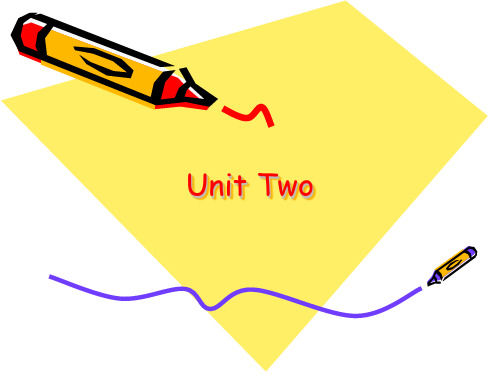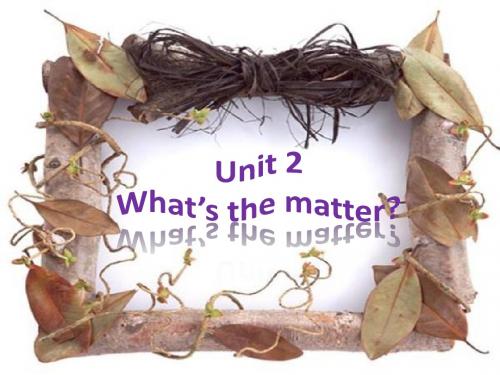大学英语基础口语教程Unit2分析解析
- 格式:pdf
- 大小:7.40 MB
- 文档页数:70

![现代大学英语口语2 Unit 2[优质PPT]](https://img.taocdn.com/s1/m/4dd46af5a98271fe900ef979.png)

1. 我的顶头上司是一个典型的工作狂,一年365天每天工作10个小时以上。
个小时以上。
(workaholic) My immediate boss is a typical workaholic, for he works for over ten hours each day all the year round. 2. 校长十分注重课外活动。
他认为,课外活动有助于培养学生对外部世界的浓厚兴趣。
厚兴趣。
(extracurricular) The principal attaches much importance to extracurricular activities and he believes believes that that that they they they will will will help help help to to to cultivate cultivate cultivate students’students’ tremendous tremendous interest interest interest in in in the the external world. 3. 星期一早上,他总是快速冲个澡,胡乱吃块三明治,接着赶着搭出租车去上班。
班。
(grab) He He always always always grabs grabs grabs a a a shower, shower, shower, a a a sandwich sandwich sandwich and and and then then then a a a taxi taxi taxi to to to go go go to to to work work work every every Monday morning. 咱们赶快吃点三明治就去看电视吧。
咱们赶快吃点三明治就去看电视吧。



全新版大学英语口语unit2Unit Two Can I take your coat?After learning this unit, you can understand explanations of dishes on a menu, offer to pay, complain effectively if there is a problem and understand restaurant review.Listening---In a restaurant1.Yes, I’ve booked a table for eight o’clock.2.No, thank you. I’ll keep it with me.3.Oh, yes, please. It’s very nice.4.Yes, it’s wonderful, thank you.5.Not yet. Can we have a little more time?6.Not for me, thank you. I’m full.7.Oh, it looks lovely! Thank you.8.Yes, please. I’ll have an orange juice.Look at these three short conversations. Try to guess the missing words. Then listen and check. 1. Customer: Hello. I for seven o’clock. The name’s Katai.Waiter: Ah, yes. Follow me, please.2. Waiter: Are you ?Customer: Yes, for I’d like the soup, please.Waiter: And for your ?Customer: I’ll have the salmon, thank you.Waiter: Very good. And would you like ?Customer: Just some mineral water, please.3. Waiter: Would you like ?Customer: No, thanks. I’m full. Can I have , please?Describing foodTell people what you ate: if the dish was a starter, a main course or a dessert; the name of the dish; the ingredients and your opinion.When we talk about different courses we use the following expressions:For a starter I had…For a main course I had…For dessert I had…For example: I went to the Khmer Caféfor dinner on Friday. For a starter, I had shrimp soup. There was a taste of coconut and lime. It was quite salty. Then for a main course I had beef stir-fry. It’s made with pineapple and tomatoes. This dish was very spicy. For a dessert I had fried bananasand ice-cream. It was delicious.Underline the positive adjectives to describe food, and circle the negative ones.Think of one food that is…salty hot and spicy sour sweet bitter savouryWrite S (steak), P (potatoes) or F (fish) next to each word. Sometimes more than one answer is possible.rare steamed sautéed baked medium roastfried well-done mashed boiled grilled (stir/deep)-friedSound smart: the schwa /?/The schwa is the weak vowel sound in an unstressed syllable and is pronounced /?/. It is very common in spoken English.1.Listen to these words. Notice the schwa.tender medium under-done wonderful salmon sugar2.Now listen to these words. Underline the schwas.waiter reservation potato pasta starter popularSpeaking---After a mealSpeaking strategy: Offering to pay1.Look at these short conversations and notice the expressions in bold.A: Let me get this, will you?B: No, it’s on me.A: Shall we split the bill?B: No. I’ll get it. This is my treat.2.What do you think B is saying in this conversation? Write your answers.A: Oh, look. Here’s the bill. I’ll get it.B: .A: Well, shall we at least split it?B: .A: Are you sure?B: .A: Thanks very much.B: .To split the bill means to share the cost equally. It is also called to go Dutch. It is quite common for people, especially young people, to go Dutch in many English-speaking countries.Speaking---Dealing with problemsSpeaking strategy: Complaining in a restaurant1.Match each complaint (a-f) with a response (1-6). Then listen and check.a We’ve been waiting for our drinks for half an hour.b Excuse me. These carrots are almost raw.c I’m afraid I asked for it rare, but this steak is virtually well-done.d I didn’t know this dish had nuts in it. I’m allergic to them.e Don’t you have any high chairs for children to sit in?f Sorry, but I asked for the bill ten minutes ago.1 Sorry, sir. I forgot to mention it. Would you like to order a different main course?2 I’ll find out what’s happened to it.3 Oh, dear. I’ll get some more for you.4 Sorry, sir. I’ll bring you another one as quickly as possible.5 Sorry, I’ll bring them for you now.6 I’m afraid not. Would a cushion do?2.Look at the complaints (a-f) and find:a an expression you can use to get the waiter’s attention.b two expressions you can use to help you complain politely.3.Imagine you are a customer in a restaurant. Look at these problems. Think of what you cansay to the waiter. Then say your answers.a Your soup is cold and your bread is rather hard.b You’ve been waiting for your main course for twenty minutes.c You don’t like the wine. You think it’s‘corked’.d The vegetables are under-cooked.e You think the bill is wrong. You have been charged too much.f You asked for sparkling mineral water, but you have still mineral water.g You asked for green salad, but it has tomato in it. You are allergic to tomato.h Your glass of mineral water is warm.Listening---Describing restaurants1 Martin Vickers is a TV food critic. He is talking about two restaurants he has been to recently. Listen and complete the review form.The Big BistroAtmosphere Good/Average/PoorService Good/Average/PoorFood quality Good/Average/PoorValue for money /10Sala ThaiAtmosphere Good/Average/PoorService Good/Average/PoorFood quality Good/Average/PoorValue for money /102 Listen again and complete Martin’s notes.The Big BistroAtmosphere: quiteStaff:Service: veryFood: (tuna salad , steak rather , potatoes )Total cost:Sala ThaiAtmosphere: andStaff: veryService:Food: absolutely (soup very , fish very )Total cost:Class bonusMake a group and role play a conversation in a restaurant.Customers: Ask about the dishes on the menu and decidewhat to have. Unfortunately the meal and the service are not very good, so you will need to complain.Waiter: Welcome your customers. Explain the dishes on the menu, take their order and serve the food.Manager: Deal with any problems and try to keep the customers happy!。
全新版大学英语2(第二版)UNIT2语言点教学文案全新版大学英语2(第二版)U N I T2语言点Unit 2 ValuesHappiness is not in the mere possession of money; it lies in the joy of achievement, in the thrill of creative effort.—— Franklin D. Roosevelt幸福不在于仅仅拥有金钱,而在于取得成就时的喜悦和创造性劳动带来的喜悦、激动。
———富兰克林·D·罗斯福Detailed ReadingⅠ. Difficult Sentences1. (LL. 1~2) It was early December 2003, my first season as a Salvation Army bell ringer,when I was confronted with the question.1. What does a Salvation Army bell ringer do?(=To ring the bell and ask people to donate money to help the poor.)2. Translate this sentence into Chinese.(=首次面对这个问题,是在2003年12月初我第一次为救世军摇铃募捐的时候。
)2. (LL. 5~6) I can still see the confusion and curiosity in his eye s as he asked, “Areyou poor?”1. Why did the boy ask such a question?(=Because he was confused and curious.)2. How much did the boy know about the Salvation Army bell ringer?(=Obviously he knew nothing about that.)3. (LL. 7~8) “Well,” I stammer e d, trying to think, “I havemore than some people, butnot as much as othe r.”1. How did the author think of the question?(=He thought it was difficult to answer.)2. What does the author’s answer mean?(=This means he is neither poor nor rich.)4. (LL. 8~9) His mother scolded him for the social no-no ...1. Wh at is “social no-no”?(=Something that is socially inappropriate.)2. Why did the mother scold her son?(=Because the author looked poor, the question was socially inappropriate toask.)5. (LL. 13~14) Yet I feel nothing more than a passing whim to attain the materialthings so many other people have.1. What do many other people have?(=The material things.)2. Please paraphrase this sentence.(=However, I have only occasionally felt the urge to go after the material things so many other people have.)6. (LL. 19~20) And I love the “can do” attitude that follows.1. Wh at is the “can do” attitude?(=That is self confidence.)2. How do you understand this sentence?(=And I love the feeling of self confidence brought by brisk exercises.)7. (L. 31) Shortly after her visit, our relationship went straight south.1. What was their relationship after her visit?(=Their relationship went sour. That is to say, they were no longer boyfriendand girlfriend.)2. Why there was such a change in their relationship?(=Because the girl actually paid much attention to material things although she claimed that she was interested in what was on the inside, and after she went to the aut hor’s apartment, she found he was really poor.)8. (LL. 35~38) There is a commercial on the radio that begins, “Everybody wants ahigh-end TV …” The pressure to purchase is real. It may be true that everybody wants a high-end TV. After all, nobody wants to be a nobody.1. What is “a high-end TV”?(=A TV that is expensive and of high quality.)2. What can be inferred from this part about what role commercials can play insociety?(=Commercials can put people under pressure to purchase more than is really necessary.)9. (L. 49) December is the time of year I feel wealthiest.Why does the author think so?(=Because December is the time for him to work for the Salvation Army as a bell ringer, which gives him a genuine sense of belonging and brings him happiness in helping others.)10. (LL. 50~51) Over the past four years, I’ve grown to understand more aboutmyself because of a single question from a curious child.1. How has the boy’s question affected the author?(=The boy’s question has helped him realize that, despitehis lack of expensive possessions, he is rich in many other ways and should be thankful for that.)2. Translate this sentence into Chinese.(=由于一个好奇的孩子提了一个简单问题,我在过去的四年中对自己的了解进了一步。